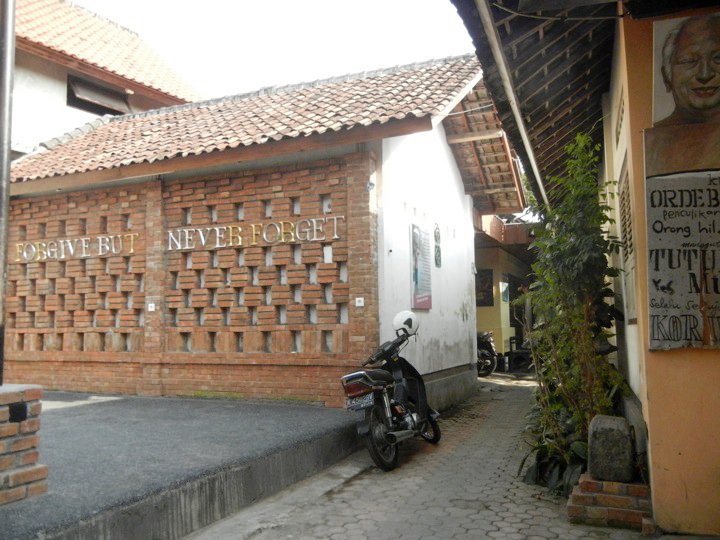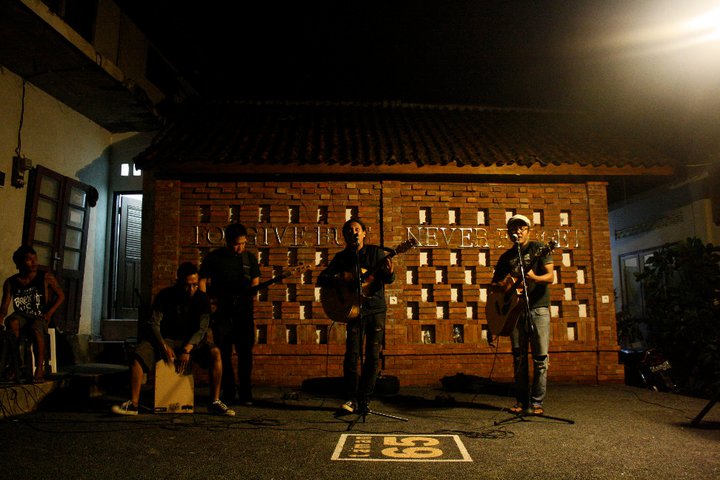Serendip is an independent site partnering with faculty at multiple colleges and universities around the world. Happy exploring!
Taman 65


During a semester off from Bryn Mawr in the spring of 2011, I became very involved with the community-based organization Taman 65 in Denpasar, Indonesia. The organization, which translates as ’65 Park, is both a physical community space, and a peace and reconciliation organization, which tries to bring together victims and offenders from the 1965 political massacres in Indonesia. After Suharto, the dictator who stayed in power for forty years, overtook the presidency in 1965 through a political coup, he carried out a CIA-sponsored communist purge. Up to a million Indonesians were killed within a six month period, many of them only having tangential ties to the communist party. What was so unique about these killings is that they often occurred within villages and even within families; brothers killing brothers, fathers killing sons. The massacres largely went unspoken until Suharto fell from power in 1998, and it became politically possible to bring up the violent memories.

The work that Taman 65 does within Denpasar communities who still live with the legacies of the ’65 massacres is inspiring. In particular, it was fascinating to watch young adults my age grapple with the reality of having relatives who were both victims and perpetrators, and trying to understand what that meant for their own identity. In addition to formal reconciliation work, Taman 65 also holds regular social gatherings, a few times a week, which are often concerts with local bands or book readings by local authors, but are sometimes guest speakers lecturing informally on politics or current events, followed by discussion. Although I very much enjoyed these events, I often held myself back from participating. Part of this was due to my language skills, which were still developing, but an even bigger part of my silence was that I often felt like my lack of personal experience made me less able to contribute to discussion about issues of political perseuction. Although I have some knowledge by proxy, being the granddaughter of holocaust survivors, I still felt uncomfortable offering my opinion because I didn’t have any personal experience to draw from. I am very much a believer that the personal is political, but sometimes it felt like my political and analytical ideas were less valuable because I couldn’t speak from a place of personal awareness.

Throughout my involvement with Taman 65, I wrestled with the conflicting desire to become a part of a community that I very much admired while still wanting to not insert myself into discussion inappropriately. I think that my strong reservations were also fueled by the fact that I was a white American entering into a space that is largely of and for local Indonesians. I always have concerns when entering other countries that my presence could be construed as (or actually be!) a form of neocolonialism. As I think back in retrospect, I am also drawn to literature on safe spaces. DeGloma writes,
Safe space provides survivor movements – broadly interpreted to include survivors, their descendants, and/or various communities of sympathizers and supporters - with a socio-cognitive foundation for the attribution of alternative meaning to a past experience, the ascription of legacy to the past via the social construction of historical continuity, the construction of a survivor collective and a narrative of social illness, and the attribution of “victim” and “perpetrator” identities.
This definition of how safe spaces are used is certainly a mouthful, but what I take from it is that a safe space allows victim and perpetrator identities to hang in the open, without any interference. I don’t think that my presence threatened the safe space of others who came to Taman 65’s public lectures, nor do I think my commentary would have necessarily been problematic, but I do think that I was entering a space that held a function beyond community dialog. DeGloma goes on to explain that “the concept of safe space functions alongside the feminist mantra “the personal is political,” emphasizing a transition from individualistic experiences to a collective acknowledgement of similarity.” I am still trying to figure out whether or not somebody else’s personal experience can become my political cause, and whether or not it is legitimate for me to hold personal emotions about somebody else’s political struggle. I think that I did both while at Taman 65, and continue to have similar feelings about the 1965 political massacres, and other episodes of political violence in Indonesia. I still haven’t quite reconciled the two sets of emotions, making me feel the need to stay distant, and the desire to engage in dialogue, and I’m not sure I ever will. What I do know, however, is that the two do not necessarily need to be dichotomous, and as I learned throughout my involvement with Taman 65, it is possible to take a step forward and take a step back at the same time.



Comments
Post new comment